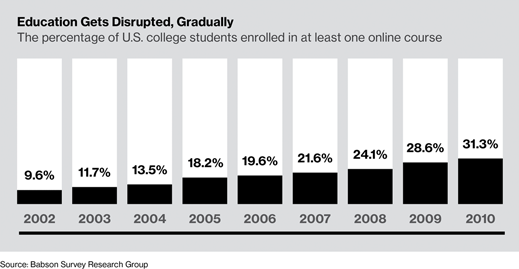Blended Learning, Cost of Education, Domestic, K-12, Minorities, MOOCs, OER - Open Educational Resources, Opinion, Personalized Learning, Required, Startups, Technology, Universities & Colleges - Written by Wired Academic on Tuesday, January 22, 2013 4:00 - 0 Comments
Heard: What’s The Single Biggest Innovation In Education In Last 200 Years?
Antonio Regalado, our former health/science writer colleague at The Wall Street Journal, wrote about the future of education recently in the MIT Technology Review. He asks what is the single biggest innovation in education in the last 200 years? The piece is worth a read (link below). First some choice excerpts here:
Don’t worry if you come up blank. You’re supposed to. The question is a gambit used by Anant Agarwal, the computer scientist named this year to head edX, a $60 million MIT-Harvard effort to stream a college education over the Web, free, to anyone who wants one. His point: it’s rare to see major technological advances in how people learn. Agarwal believes that education is about to change dramatically. The reason is the power of the Web and its associated data-crunching technologies. Thanks to these changes, it’s now possible to stream video classes with sophisticated interactive elements, and researchers can scoop up student data that could help them make teaching more effective. The technology is powerful, fairly cheap, and global in its reach…
Khan’s simple videos aren’t without their critics, who wonder whether his tutorials really teach math so well. “We agree 100 percent we aren’t going to solve education’s problems,” Khan responds. But he says the point to keep in mind is that technology-wise, “we’re in the top of the first inning.” He’ll be pouring about $10 million a year into making his videos better—already there are embedded exercises and analytics that let teachers track 50 or 100 students at once. Pretty soon, Khan told me, his free stuff “will be as good or better than anything anyone is charging money for.” Digital instruction faces limits. Online, you will never smell a burning resistor or get your hands wet in a biology lab. Yet the economics of distributing instruction over the Web are so favorable that they seem to threaten anyone building a campus or hiring teachers. At edX, Agarwal says, the same three-person team of a professor plus assistants that used to teach analog circuit design to 400 students at MIT now handles 10,000 online and could take a hundred times more…
Even though only a small fraction of those will actually complete a class, the rise of the MOOCs means we can begin thinking about how free, top-quality education could change the world. Khan’s videos are popular in India, and the MOOC purveyors have found that 60 percent of their sign-ups are self-starters from knowledge-hungry nations like Brazil and China. Nobody knows what a liberal application of high-octane educational propellant might do. Will it supersize innovation globally by knocking away barriers to good instruction? Will frightened governments censor teachers as they have the Web?
Technology will define where online education goes next. All those millions of students clicking online can have their progress tracked, logged, studied, and probably influenced, too. Talk to Khan or anyone behind the MOOCs (which largely sprang from university departments interested in computer intelligence) and they’ll all say their eventual goal isn’t to stream videos but to perfect education through the scientific use of data. Just imagine, they say, software that maps an individual’s knowledge and offers a lesson plan unique to him or her. Will they succeed and create something truly different? If they do, we’ll have the answer to our question: online learning will be the most important innovation in education in the last 200 years.

Campus Buzz
We welcome Tips & Pitches
Latest WA Original Features
-
“Instreamia” Shakes Loose Moss By Launching Spanish Language Mini-MOOC
-
Jörn Loviscach: A German Math Teaching Sensation Emerges On YouTube & Udacity
-
Open University Enters Battle Of The MOOCs, Launches “FutureLearn”
-
Alvaro Salas As A Case Study In Crowd-Funding An Ivy-League Education
-
Jonathan Mugan: How To Build A Free Computer Within A Computer For Your Child
Paul Glader, Managing Editor
@paulglader
Eleni Glader, Policy Editor
Elbert Chu, Innovation Editor
@elbertchu
Biagio Arobba, Web Developer
@barobba
Contributors:
Michael B. Horn
@michaelbhorn
Derek Reed
@derekreed
Annie Murphy Paul
@AnnieMurphyPaul
Frank Catalano
@FrankCatalano
Ryan Craig
@UniVenturesFund
Jonathan Mugan
@JMugan
Terry Heick
@TeachThought
Alison Anderson
@tedrosececi
Ravi Kumar
@ravinepal

The Pulitzer Prize winning investigation newsroom digs into for-profit education.
-
Most Viewed
- Inside Ashford University: A former staffer talks to WiredAcademic
- Pearson Llc + Google Expands LMS Business With "OpenClass" System
- Guest Column: Why Steve Jobs would have loved digital learning
- Jörn Loviscach: A German Math Teaching Sensation Emerges On YouTube & Udacity
- Open University Enters Battle Of The MOOCs, Launches "FutureLearn"
-
MARKET INTRADAY SNAPSHOT
- Education & Tech Companies We Follow
| APEI | 37.61 |  -0.76 -0.76 |  -1.98% -1.98% | ||
| APOL | 20.57 |  +0.01 +0.01 |  +0.05% +0.05% | ||
| AAPL | 447.19 |  -3.31 -3.31 |  -0.73% -0.73% | ||
| BPI | 10.61 |  +0.05 +0.05 |  +0.47% +0.47% | ||
| CAST | 0.06 |  0.00 0.00 |  +0.00% +0.00% | ||
| CECO | 3.47 |  +0.04 +0.04 |  +1.17% +1.17% | ||
| COCO | 2.62 |  +0.02 +0.02 |  +0.77% +0.77% | ||
| CPLA | 28.25 |  -0.39 -0.39 |  -1.36% -1.36% | ||
| DV | 24.34 |  -0.09 -0.09 |  -0.37% -0.37% | ||
| EDMC | 3.82 |  +0.04 +0.04 |  +1.06% +1.06% | ||
| ESI | 15.71 |  -1.15 -1.15 |  -6.82% -6.82% | ||
| GOOG | 756.6699 |  +2.8399 +2.8399 |  +0.38% +0.38% | ||
| LINC | 5.20 |  -0.05 -0.05 |  -0.95% -0.95% | ||
| LOPE | 23.45 |  +0.80 +0.80 |  +3.53% +3.53% | ||
| PEDH | 0.20 |  0.00 0.00 |  +0.00% +0.00% | ||
| PSO | 18.87 |  +0.05 +0.05 |  +0.27% +0.27% | ||
| SABA | 9.64 |  -0.01 -0.01 |  -0.10% -0.10% | ||
| SCHL | 29.34 |  -0.34 -0.34 |  -1.15% -1.15% | ||
| STRA | 55.61 |  -0.34 -0.34 |  -0.61% -0.61% | ||
| WPO | 385.955 |  -1.985 -1.985 |  -0.51% -0.51% |
Domestic, Education Quality, For-Profit, Friend, Fraud, or Fishy, Graduate, International, Private, Public, Regulatory, Required, Universities & Colleges - Jan 14, 2013 6:00 - 0 Comments
Ryan Craig: American Clampdown Forcing Forlorn For-Profit Colleges To Look Abroad
More In For-Profit
- How For-Profit Colleges Major In Marketing & Fail Education
- Infographic: A Graphical Profile Of Today’s Online College Student
- Infographic: A Comparison Of For-Profits v. Non-Profit Online College Data
- Opinion: How “Shareholder Value” Is Destroying For-Profit, Career Colleges
- Avenues: The World School Opens To Fanfare & Critics Of Elitist High-Tech
Blended Learning Domestic For-Profit International K-12 Private Required Technology
Continuing Education, Domestic, Opinion, Personalized Learning, Required, Technology - Jan 25, 2013 6:00 - 0 Comments
Columnist Terry Heick: Here Are 4 Principles To Guide You In Digital Literacy
More In Technology
- Interview With NYC Schools’ Social Media Chief Lisa Nielsen On Next Gen Ed
- Columnist Annie Murphy Paul: The Emerging Science Of How We Learn
- The Europas Name Top 10 & Annoint New European Ed Tech Darling: Scolibri
- Heard: What’s The Single Biggest Innovation In Education In Last 200 Years?
- “Instreamia” Shakes Loose Moss By Launching Spanish Language Mini-MOOC
Continuing Education Domestic Feature Language Learning MOOCs OER - Open Educational Resources Open Source Education Personalized Learning Required Startups Technology
Domestic, Education Quality, For-Profit, Friend, Fraud, or Fishy, Graduate, International, Private, Public, Regulatory, Required, Universities & Colleges - Jan 14, 2013 6:00 - 0 Comments
Ryan Craig: American Clampdown Forcing Forlorn For-Profit Colleges To Look Abroad
More In Friend, Fraud, or Fishy
- Opinion: The Problem With Deceptive Degree Aggregators In The Search For Online Courses & Degrees
- How For-Profit Colleges Major In Marketing & Fail Education
- Infographic: A Comparison Of For-Profits v. Non-Profit Online College Data
- Opinion: How “Shareholder Value” Is Destroying For-Profit, Career Colleges
- The Incredible Expansion Of Charter Schools In American School Districts
Charter Domestic Education Quality Friend, Fraud, or Fishy K-12 Minorities Required



Leave a Reply